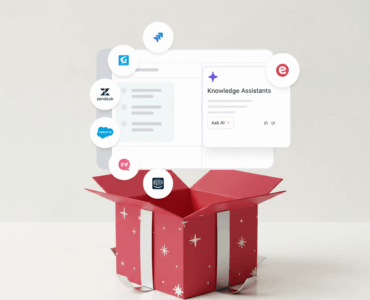11 Feb

Knowledge management for IT Service Desk and Support teams : the complete guide
Knowledge management guide for IT Service Desk and support teams. Centralise technical docs, reduce tickets by 40-60%, and improve resolution times.
08 Feb

AI and Knowledge Management: The Complete Guide
Here’s an uncomfortable truth: 95% of enterprise AI projects fail to deliver measurable return on investment. Not because the models are inadequate. Not because the technology isn’t ready. They fail
02 Feb

Elium Leader in Lecko 2026 : AI Knowledge Management
Elium ranks among the leaders in the Lecko 2026 benchmark for Knowledge Management and generative AI. This recognition validates our approach: you’ll never achieve competitive AI without a structured AI
14 Jan

Why AI Projects Fail: The Knowledge Foundation Gap
Discover why 95% of AI projects fail. Learn how knowledge infrastructure gaps, not technology, cause AI failures and prevent scaling. Evidence-based analysis.
20 Dec

How to Write SOPs That Actually Work for Operations & Onboarding
Create SOPs that accelerate onboarding by 70%, preserve knowledge when employees leave, and reduce compliance risks by 60%. Research-backed guide for operations & HR teams.
11 Dec

AI knowledge management: why enterprises fail at the foundation
Enterprises deploy AI before fixing their knowledge foundations. SPIE ICS proved the opposite works: build robust AI knowledge management first, then 73% faster results follow.
03 Dec

10 ways our AI knowledge management software got smarter
AI knowledge management software is only as smart as the knowledge feeding it. What happens when your AI gets the wrong answer? Usually, it’s not the AI that’s broken– it’s
17 Nov

How AI and Knowledge Management Work Together
Discover how AI and knowledge management create value together. Learn the foundations, architecture, and best practices for enterprise knowledge infrastructure.
10 Oct

What Is RAG (Retrieval Augmented Generation)?
Discover what RAG (Retrieval Augmented Generation) is, how it works, and why 80% of implementations fail due to poor data quality. Learn the essential foundations for RAG success—from clean data
25 Aug

How AI Ensures Accuracy and Timeliness in Your Knowledge Base
In an era where information is king, the significance of an efficient knowledge management system cannot be overstated. Organisations across the globe are constantly searching for methods to not only





